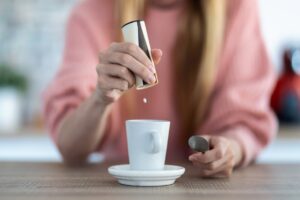
Urinary incontinence is no fun. The uncontrollable urge to get to the bathroom, or even worse, leaking urine unexpectedly, may be exacerbated by artificially-sweetened beverages.
A new study suggests that women who drink artificially sweetened beverages – like flavored waters, diet sodas, iced teas, coffees, etc. – are more likely to report symptoms of urinary incontinence.
Symptoms include occasionally leaking urine – perhaps when coughing, sneezing, or laughing – to having such an overwhelming urge to go that you may not make it to the bathroom in time.
Researchers looked at data from more than 80,000 women participating in the Women’s Health Initiative Observational Study to see how these drinks may impact bladder function.
They found that those who drank one to six artificially sweetened beverages per week, or more than one per day, were far more likely to have bladder issues than those who drank between zero and one.
These results do not prove that these sweetened drinks cause urinary incontinence, nor do they suggest that people should switch to sugar-sweetened beverages to improve health.
The main takeaway is that if bladder control is a problem for you, limiting artificial sweetener consumption may help improve symptoms.
Other drinks, foods, and medications may impact bladder control as well. They include:
- Alcohol
- Caffeine
- Carbonated drinks/sparkling water
- Chocolate
- Chili peppers
- Spicy, sugary, or acidic foods/drinks
- Heart and blood pressure medications, sedatives, and muscle relaxants
- Large doses of vitamin C
Avoiding these things, when possible, may help prevent flare-ups.